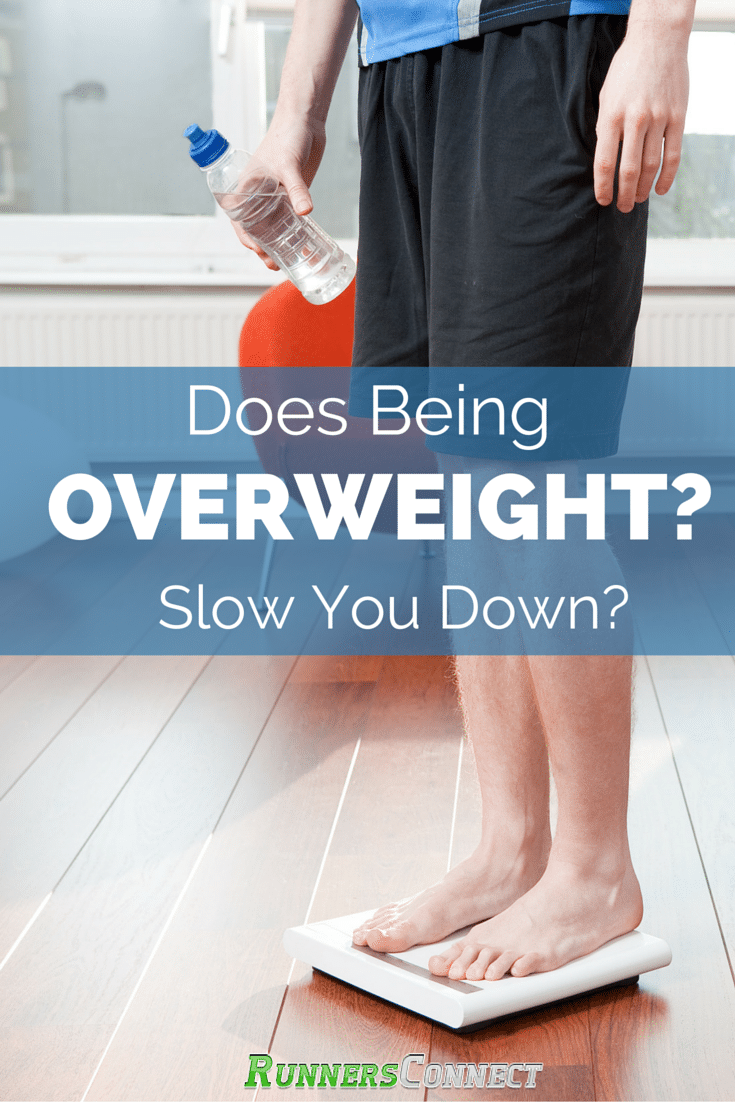 It’s a no-brainer for most people that extra weight will slow you down when you run.
It’s a no-brainer for most people that extra weight will slow you down when you run.
A few too many cookies enjoyed over the winter, or even just a water bottle strapped to your waist will, in theory, slow you down by increasing the metabolic cost of running. But how much will a given amount of excess weight slow you down?
Fortunately, this sort of question is fairly straightforward from a scientist’s perspective—all you need to answer it is a treadmill, a weight vest, and some basic VO2 testing equipment.
How does being overweight make me run slower?
Several studies have examined the question of excess weight and running with slightly different approaches. The first one we’ll look at was conducted by Kirk Cureton and colleagues at the University of Georgia in 1978.
Using weighted vests, the researchers measured the changes in oxygen uptake and performance on a 12-minute time trial when the six subjects ran with 5, 10, and 15% excess weight (relative to their normal body weight) as compared to a control trial with no added weight. Predictably, the excess weight resulted in more oxygen consumption for a given pace and worse performance over the 12-minute time trail.
For every 5% of excess weight (7.5 pounds for a 150lb runner), the subjects covered 90 meters fewer over the 12-minute time trial.
Extrapolating this to an 18 minute 5k runner (whose race lasts one and a half times the duration of the time trial in this study), this would mean our runner would be about 30 seconds slower when carrying an excess weight of 5% of his or her original body weight.
Does weight affect men and women differently?
Cureton followed up this study with a similar investigation two years later, though this time his focus was on sex differences in performance. Could the intrinsic differences in body fat percentage between men and women account for the difference between male and female athletic performance?
Using a similar protocol as the first study, Cureton and Sparling evaluated the oxygen consumption and 12-minute time trial performance of 10 men and 10 women without any added weight. Then, after measuring the body fat percentages of the subjects, the researchers had the men tested again, this time with 7.5% added body weight—the overall weight disparity between a man and a woman with equal muscle and bone mass.
While the difference in body fat between men and women only accounted for a bit under 40% of the difference in performance between the sexes, the change in performance over the 12-minute time trial in the men when the excess weight was added was quite similar to the first study—23 meters per one percent of excess weight, or 115 meters per 5% compared to 90 meters in the first study.
For studies with rather small sample sizes—six and 10 subjects for the first and second studies, respectively—this is pretty good!
How does body weight slow me down?
The larger role of body weight in running energetics is well-illustrated in a fascinating 2007 study by Lenart Teunissen, Alena Grabowski, and Rodger Kram.
Using a treadmill and harness system, along with weighted belts, Teunissen et al. aimed to separate the effects of body weight and body mass on your energy expenditure while running.
Though this might seem a bit odd to grasp at first, remember that it is your weight—the downward pull on your body by gravity—that you have to support with your muscles when you run, but it is your mass that you are actually propelling forward.
So, if you were running six-minute mile pace on the moon, your weight would change but your mass, which you must accelerate to six-minute mile pace, would not.
By using the harness and the weighted belts, Teunissen et al. were able to determine the relative contributions of vertical support of your weight and horizontal propulsion of your mass.
More relevant to our interests, they found that each percentage increase in body mass resulted in a 1.4% increase in overall metabolic cost.
However, since this study did not include a time trial or other direct performance measurement like Cureton’s studies, we can’t compare them directly, and it is hard to say whether a 1.4% change in metabolic cost will necessarily result in exactly a 1.4% change in performance on race day.
As it turns out, supporting your body weight (not propelling your mass forward) is to blame for much of the energetic cost of running.
Teunissen et al.’s study also found that increases and decreases in body weight have a significant effect on the impact forces while running, which is supported by some other studies which have found a moderate relationship between higher BMIs and injuries.
This should be interpreted with caution, however, because having a low BMI has been correlated with injuries as well! Recent research has actually found that runners weighing more are less likely to get injured than those with a low BMI.
Nab Our FREE 4-part Weight Loss Email Course
You’ll learn the science behind losing weight and still running well so you can understand the “why” of weight loss for long-term success.
Lessons include why simply running more and eating less won’t help you lose weight, why your weight fluctuates each day, and the best way to distribute calories throughout your day. Plus more…
What you should keep in mind
While these studies are pretty informative, and they can even give us some rules of thumb regarding performance (between 90 and 115 meters per 12 minutes of running per 5% excess body weight, or about 1.4% excess cost per 1% excess body weight), there are several caveats to keep in mind.
First, all of these studies added weight artificially; they didn’t measure how natural weight gain over time can affect performance. It’s likely that the performance deficit isn’t quite so bad when weight gain is gradual, since your body has a chance to adapt to the excess weight.
But runners often do have to carry around artificial weight from time to time.
A decent-sized water bottle is about two pounds when full, and camelback-style hydration packs can be upwards of five pounds.
Keep this in mind when you are doing long runs over the summer! You’ll have to evaluate the benefits of frequent hydration against the costs of carrying around the excess weight.
Finally, do keep in mind that losing weight, especially rapidly, can go hand-in-hand with muscle loss, making the idea of cutting down to “racing weight” a bit suspicious, especially for runners who are already lean and fit.
But if you put on a few pound over the winter, easing back into a leaner build will probably allow you to claw back a predictable amount of fitness.
And if you often run with a water bottle, hydration pack, or other backpack, keep in mind that the excess weight will slow you down.









One Response
That’s too funny that you wrote this article today… I was planning on sending you an email and asking you the same question today!
I’ve read things over the years about this and someone was asking me on the weekend about the rule of thumb, but I couldn’t remember. But I said, it should be easy enough to figure out, as some derivative of E=MC2.
I agree with your general conclusions, but I’m also a bit of an excel geek and like to work things out as a calculator. If we use your rule of thumb of about 100 meters per 12 minutes of running per 5% excess body weight, or about 1.4% excess cost per 1% excess body weight… I calculated I would gain about 42 sec per 1 lbs (based on a 3:30 marathon and 191 lbs).
I’m sure you wouldn’t want to be cornered to being that exact, and I would think that if one was to build a curve on these results it might be curvilinear (not linear), but still being able to plug in a few numbers into a calculator to see how much time one could gain by losing some winter warmth, would be helpful! Care to give it a go?!
PS. My winter warmth was actually “open water warmth”… as I was 185 lbs at Ironman Canada, then deliberately put on 15 lbs to prepare to swim across Lake Ontario… now that that’s done, I’m on my way back down to my running/tri weight… so I was curious about the weight loss vs speed equation.
Cheers,
Rob